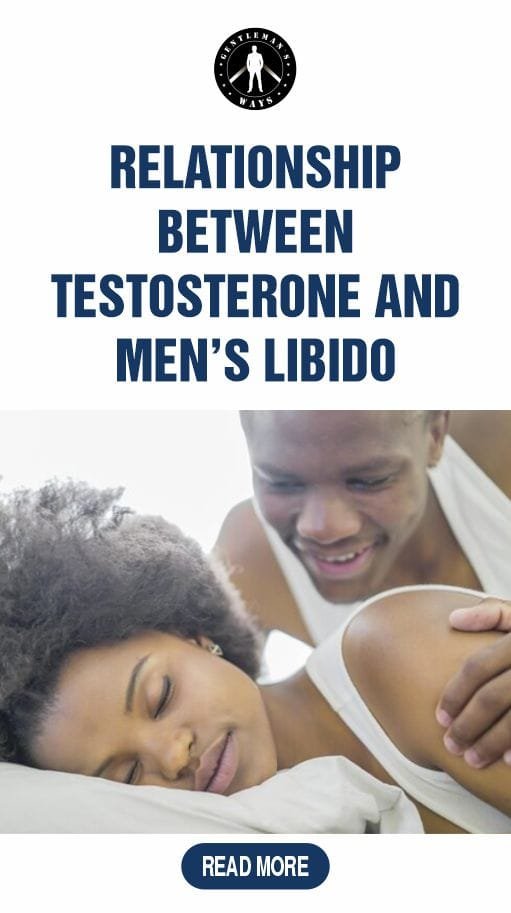Last updated on December 28th, 2025 at 07:29 pm
Testosterone and men’s libido share a powerful connection. When your testosterone dips, desire, confidence, and performance can too.
The connection between testosterone and your libido goes beyond numbers on a test result.
How you eat, move, sleep, and manage stress directly shapes your desire and performance.
When testosterone drops, you might feel it through low energy, mood changes, or less interest in intimacy.
But rebuilding that spark starts with consistent daily choices.
Strength training, nutrient-rich foods, and restful sleep help your body produce healthy testosterone levels naturally.
Reducing stress and nurturing emotional balance also makes a real difference in how connected you feel to your partner.
Instead of chasing quick fixes, focus on small habits that restore confidence, energy, and passion.
When your body and mind work in sync, your libido naturally follows.
If you are new to the testosterone discussion, here is a good place to start.
The Link Between Testosterone and Men’s Libido
Testosterone plays a central role in your intimacy desire, but it’s not the only factor that shapes your libido.
Low testosterone can affect your interest in intimacy, yet stress, mood, and lifestyle choices often have equal impact.
Hormones like dopamine and serotonin also influence how much desire you feel.
Dopamine drives pleasure, while too much serotonin can dull arousal.
When stress increases, cortisol rises and testosterone drops, making you feel disconnected or less responsive.
Managing stress, staying active, eating well, and sleeping enough help balance these hormones naturally.
Your libido reflects the state of your physical, emotional, and hormonal health combined.
By caring for your body and mind, you keep testosterone levels healthy and your sexual drive strong and responsive.

Signs Testosterone Might Be Affecting Your Drive
When testosterone levels change, your energy and interest in intimacy can shift in ways that feel confusing.
These changes may appear slowly, and noticing them early can help you take control of your overall health and confidence.
Reduced Interest in Intimacy
You may notice that your desire for closeness has decreased. Activities that once felt exciting may now seem unimportant or easily ignored.
This lowered interest can be linked to changes in testosterone, which affect the brain’s response to connection and pleasure.
If your motivation feels lower than usual, it may be time to review your hormone balance.
Difficulty Staying Aroused
Testosterone supports circulation and sensitivity, both important for arousal.
When levels dip, you may experience more difficulty getting or staying aroused.
Occasional challenges are normal, but frequent ones may suggest a hormonal imbalance.
Addressing it early can help restore your confidence and ease the stress that makes the problem worse.
Low Energy and Fatigue
A drop in testosterone can leave you feeling drained, even with enough rest.
This fatigue can make it hard to stay active or interested in closeness.
Regular physical activity, quality sleep, and balanced meals can help your energy recover while supporting natural testosterone balance.
Mood Changes and Irritability
Testosterone influences your mood and motivation. When levels fall, you may feel more impatient, anxious, or distant from others.
These emotional shifts can reduce your interest in affection and create tension in relationships.
Maintaining balanced hormone levels can help you feel calmer, more connected, and emotionally stable.
When Hormones and Emotions Interact
Sometimes changes in drive come from emotional stress rather than hormones alone. Yet both are connected.
Ongoing fatigue, low mood, or reduced motivation deserve attention.
Speak with a qualified healthcare provider about testing your hormone levels.
Addressing the underlying cause can help restore balance and improve your overall well-being.
Related Posts
Causes of Low Testosterone Level
Men Over 40: Your Testosterone Boosters
Natural Foods for Testosterone Boost
Your Kitchen Should Not Lack These Testosterone-Boosting Herbs
What Really Works to Improve Libido and Testosterone Naturally
Improving your testosterone levels and sexual drive naturally starts with consistent habits that support both your body and mind.
The right combination of movement, nutrition, rest, and emotional balance can help your hormones function properly and restore your natural energy and desire.
Strength Training and Physical Activity
Lifting weights and staying active do more than build muscle.
Regular resistance workouts stimulate testosterone production and improve circulation, both of which are important for a healthy drive.
High-intensity training that challenges your body in short bursts can also boost metabolism and support hormone balance.
Staying active helps you feel stronger, more confident, and more responsive.
Balanced Nutrition and Micronutrients
What you eat directly affects your hormones. A diet rich in zinc, magnesium, vitamin D, and healthy fats helps your body create and regulate testosterone.
Include foods like eggs, fish, leafy greens, whole grains, and nuts.
Cut back on processed meals, excess sugar, and trans fats since they can reduce hormone efficiency and lower energy levels.
Quality Sleep and Restful Recovery
Your body produces most of its testosterone during deep sleep.
When you sleep less, hormone levels drop, energy declines, and desire weakens.
Aim for consistent rest by keeping a regular bedtime, creating a quiet sleep environment, and avoiding screens before bed.
Proper sleep restores both your physical stamina and mental sharpness.
Managing Stress and Emotional Health
Chronic stress increases cortisol, a hormone that suppresses testosterone and reduces your interest in intimacy.
Practices like deep breathing, journaling, and mindfulness can calm your mind and support hormonal balance.
Prioritize mental peace by setting boundaries, taking breaks when needed, and engaging in activities that bring joy and relaxation.
Limiting Alcohol and Avoiding Smoking
Alcohol and tobacco can both interfere with healthy testosterone production and circulation.
Too much alcohol affects hormone conversion, while smoking limits blood flow and oxygen supply.
Cutting back on these habits helps improve stamina, confidence, and responsiveness in intimate moments.
Mental and Emotional Connection
Your emotional well-being directly affects your drive.
Feeling disconnected, anxious, or unappreciated can lower desire even when your hormones are balanced.
Spend quality time with your partner, communicate openly about needs, and address emotional concerns early.
Building trust and connection reignites attraction and supports healthy intimacy.
The Power of Consistency
Improving testosterone and libido naturally takes consistency. Each habit supports the other.
Good nutrition fuels better workouts, proper sleep regulates hormones, and stress control boosts mood and energy.
When you commit to this balance, your body responds with renewed strength, focus, and desire that feels natural and lasting.
Supplements That May Support Testosterone and Libido
Some natural supplements can help your body maintain healthy testosterone levels and improve libido when used responsibly.
They work best when combined with a balanced diet, consistent exercise, and proper rest.
If you are considering supplements, focus on those that have been studied for their potential to support men’s sexual health naturally.
Fenugreek
According to Healthline, fenugreek is a herb that contains compounds known as furostanolic saponins, which may support testosterone production and improve intimacy desire.
Some men who use it report better mood, higher energy, and improved satisfaction in the sheets.
It may also help reduce fatigue and balance blood sugar levels, both of which influence hormone health.
Ashwagandha
Ashwagandha, sometimes called Indian ginseng, is known for its ability to reduce stress and support hormonal balance.
High stress raises cortisol, which can lower testosterone.
By calming your mind and improving energy, ashwagandha helps create a better hormonal environment for libido and performance.
It can also boost overall vitality and stamina.
Maca Root
Maca root has been used for centuries in traditional medicine to support reproductive health and energy.
While it may not directly raise testosterone, it can increase libido and endurance by improving mood and reducing fatigue.
Many men find that maca helps them feel more active, confident, and emotionally balanced.
L-Citrulline
L-citrulline is an amino acid that helps improve blood circulation by raising nitric oxide levels in the body.
Better blood flow can improve physical response and stamina during intimacy.
Though it does not directly influence testosterone, its effect on circulation supports overall sexual performance and energy.
A Word on Safety and Real Expectations
Not all supplements are safe or backed by reliable research.
Some products marketed as testosterone boosters can contain ingredients that may be harmful or ineffective.
Always talk with your healthcare provider before starting any supplement.
Safe use, combined with a healthy lifestyle, helps you get the best results without risking your well-being.
When to Seek Medical Advice
If you notice persistent low energy, reduced sexual desire, erectile challenges, or mood changes, it may be time to consult a healthcare professional.
These signs can indicate low testosterone, also called hypogonadism, but they may also stem from other health conditions, making a thorough evaluation important.
Diagnosis usually involves a medical history review, physical exam, and blood tests measuring testosterone levels, ideally in the morning when levels peak.
Additional tests may be needed to identify the underlying cause, such as issues with testicular function or the pituitary gland.
If low testosterone is confirmed, your doctor can discuss treatment options, including testosterone replacement therapy.
Supervised therapy ensures safe hormone levels, allows proper monitoring, and supports improved energy, libido, and overall well-being.
Lifestyle Changes to Boost Libido
Improving your libido and testosterone levels starts with simple, consistent habits that support your body and mind.
Small changes in movement, diet, sleep, and stress management can make a noticeable difference in energy, desire, and overall well-being.
Regular Exercise
Staying active helps your body produce testosterone naturally while boosting energy and stamina.
Strength training builds muscle and stimulates hormones that support sexual drive.
Cardiovascular exercise improves circulation, which is essential for responsiveness and endurance.
A consistent routine can help you feel stronger, more confident, and more engaged both physically and emotionally.
Balanced Diet and Nutrition
What you eat directly affects your hormones and sexual health.
Include foods rich in healthy fats, proteins, and vitamins, such as leafy greens, nuts, fish, and lean meats.
Avoid processed foods, excess sugar, and trans fats that can lower testosterone and reduce energy.
Eating well supports hormone production and overall vitality.
Quality Sleep
Testosterone production peaks during deep sleep, making rest vital for libido and energy.
Stick to a regular sleep schedule, create a dark and quiet environment, and limit screen time before bed.
Good sleep restores energy, sharpens focus, and helps your body maintain healthy hormone levels naturally.
Stress Management
Chronic stress increases cortisol, which can lower testosterone and decrease sexual desire.
Daily stress-relief practices like meditation, yoga, or hobbies help you relax and maintain hormonal balance.
Taking time to unwind improves your mood, energy, and motivation for intimacy, allowing desire to return naturally.
Consistency and Routine
Lifestyle changes work best when you stick with them. Regular exercise, a nutrient-rich diet, proper rest, and stress management reinforce each other.
By making these habits part of your daily routine, you support healthy testosterone levels, stronger energy, and a libido that responds naturally.
Creating a Holistic Approach to Boosting Libido
Boosting your libido is more than addressing one factor.
It involves a combination of physical health, nutrition, emotional balance, and smart supplementation to support testosterone levels and overall sexual energy.
Prioritize Physical Health
Regular exercise strengthens your heart, improves circulation, and helps maintain healthy hormone levels.
Strength training and cardiovascular activity support testosterone production while promoting weight management.
Staying active also increases stamina, energy, and confidence, all of which naturally improve sexual desire and responsiveness over time.
Focus on Nutrition
Your diet has a direct impact on testosterone and sexual performance. Include foods rich in zinc, omega-3 fatty acids, vitamin D, and vitamin B.
Lean proteins, fruits, vegetables, and healthy fats fuel your body and support hormone production.
Staying hydrated and limiting processed foods also helps maintain energy and libido.
Support Emotional Well-Being
Stress, anxiety, and fatigue can lower your desire for intimacy.
Practices like mindfulness, meditation, and yoga help calm your mind and reduce cortisol, supporting hormone balance.
Open communication with your partner strengthens emotional connection, trust, and intimacy confidence, which naturally enhances libido.
Consider Safe Supplementation
Certain natural supplements, including fenugreek, ashwagandha, and ginseng, may support testosterone levels and sexual function.
Use these under professional guidance to ensure safety, proper dosing, and effectiveness alongside lifestyle changes.
Consistency Creates Results
Combining exercise, nutrition, emotional care, and safe supplementation builds a supportive environment for testosterone and sexual health.
Regular attention to these areas improves energy, desire, and overall vitality, helping you maintain a healthy and responsive libido.
Conclusion
Testosterone and libido are closely connected, but your sexual desire depends on more than hormone levels.
Your energy, mood, and emotional state all play a role in intimacy and responsiveness.
You can support healthy testosterone and a strong libido through consistent habits such as regular exercise, nutrient-rich foods, quality sleep, and stress management.
Emotional connection and open communication with your partner also influence desire, making intimacy more fulfilling.
Supplements like fenugreek, ashwagandha, or maca may offer support when used safely, but they work best alongside a healthy lifestyle.
By combining physical care, mental balance, and smart supplementation, you create conditions that help your energy, confidence, and desire naturally return.
Frequently Asked Questions
What foods naturally boost testosterone and libido?
Lean proteins, leafy greens, nuts, fatty fish, and foods rich in zinc, magnesium, and vitamin D support testosterone and help maintain sexual desire.
Can exercise really improve sexual desire in men?
Yes, strength training and cardiovascular activity increase testosterone, improve circulation, energy, and stamina, all of which naturally boost libido and responsiveness.
Are supplements like fenugreek or ashwagandha safe for boosting libido?
When used responsibly under professional guidance, these supplements may support testosterone and sexual function, but results vary, and they work best with lifestyle changes.
When should I see a doctor about low libido?
Consult a healthcare provider if you notice persistent low energy, reduced sexual desire, erectile challenges, or mood changes to evaluate hormone levels safely.
References
- Testosterone and Sex Drive: Exploring the Connection
- Relationship between Libido and Testosterone Levels
Pyo Merez is a men’s lifestyle enthusiast and writer about the gentleman’s place and impact on society. Raised by a distinguished gentleman dad, he offers unique insights into how the mind of a gentleman works and how societal norms shape gentlemen’s identity and vice versa.
Through his insightful articles, Pyo taps into the depths of gentleman culture to provide perspectives on etiquette and manners in modern society.

